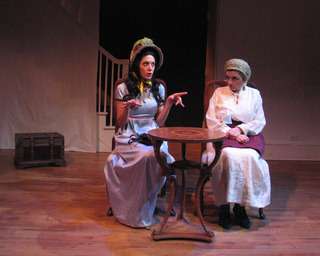|
Back
Upstairs, Downstairs New York
The Cell Theater
02/03/2010 - & February 4, 6, 7, 12, 13, 14, 17, 18, 19, 20*, 21, 2010
Franca Valeri: Tosca e le altre due
Laura Caparrotti (Emilia), Marta Mondelli (Iride), Rocco Sisto (Prologue voice-over)
Laura Caparrotti (Director), Lucretia Moroni (Set Design), Natasha Lardera (English translations), Nick Ryckert (Lighting and Audio)

M. Mondell & L. Caparrotti (© J. Slaff)
On a summer night in Rome, 1800, two women of the stage play out pivotal scenes in their own lives in different parts of the Palazzo Farnese. One drama transpires upstairs as the opera singer Tosca struggles against the machinations of Scarpia, the obsessed and sadistic chief of police, in a desperate bid to save the life of her lover Cavaradossi. This story we know. In Tosca e le altre due, however, playwright Franca Valeri gives us a glimpse into the lives of some of the common people within the Palazzo Farnese, through a quieter more internal drama which plays out below stairs. Here the former actress Iride, now married to Scarpia’s chief torturer, gossips with Emilia, the Palazzo’s doorkeeper, as they wait for her husband’s shift to end.
Laura Caparrotti, as Emilia, creates for us a woman largely, though not entirely resigned to her lot in life. She is animated mainly by scraps of gossip and her protective devotion to her employer, the Baron Scarpia. She even worries about the poor appetite of this monster of unappeasable appetites. Much of her character is conveyed in sharp glances and significant looks, which contribute greatly to the wry humor of the piece. Marta Mondelli, as Iride, slowly reveals to us a woman who still retains some passion for life. Her unfolding story brings a touch of drama to this satirical play, as she convincingly struggles to recover her sense of self against a backdrop of oppression, domestic violence and superficial propriety.
The scene downstairs plays out on the fringes of the familiar melodrama of Tosca. Somewhat in the mode of Rosencrantz and Guildenstern are Dead, which references Shakespeare’s Hamlet through the eyes of two subordinate characters, here the two women comment on the comings and goings, and overhear snatches of the upstairs drama provided by a recording of the opera. They are periodically interrupted by horrible screams, which Emilia barely registers as part of the daily business of Palazzo Farnese. In contrast, Iride becomes increasingly perturbed by the fruits of her husband’s labor.
During the climactic scene, in which Iride reaches a life changing decision, she suddenly starts to channel the diva upstairs. The two stories have reached a confluence, and dialogue is taken almost directly from the libretto of Tosca. For anyone familiar with the opera, an ostensibly serious scene acquires a highly comic gloss. Ridiculous and sublime, this was the highlight of the evening, although it was apparently missed by many in the audience.
The play, in its U.S. premiere, was performed in Italian, with English surtitles. Despite some difficulties with projection, including a softly audible curse when Powerpoint unexpectedly exited presentation mode early in the evening, the translations enabled a largely English-speaking audience to follow and enjoy this small satirical gem. Kairos Italy Theater is a bilingual Italian-English company devoted to the presentation of Italian literary theater. On the night of this review, a group of Italian students from a school on Long Island were present in the intimate confines of “the Cell.” After the play, actress and director Laura Caparrotti lead a question and answer session with them. Ms. Caparrotti is an expert on the life and work of Franca Valeri, having written her academic dissertation on the playwright, actress, and opera producer. She shared her insights and admiration for this accomplished woman with gusto, and seems an enthusiastic ambassador for Italian culture in New York.
Arlene Judith Klotzko
|